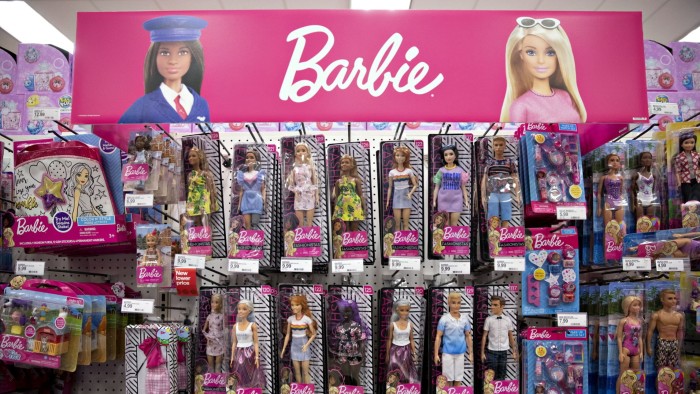Unlock the Editor’s Digest for free
Roula Khalaf, Editor of the FT, selects her favourite stories in this weekly newsletter.
Donald Trump has excluded smartphones, laptops and other consumer electronics from his “reciprocal tariffs”, but 46 of the 50 items the US most relies on China for are still subject to the levies.
Analysis of items with a total import value of more than $1bn shows the potential impact the new measures could have on US consumers.
More than three-quarters of the video game consoles, food processors and electric fans imported into the US last year were made in China. Anyone hoping to purchase toys will also have to grapple with higher prices. China made 75 per cent of the dolls, tricycles, scooters and other wheeled toys delivered to US consumers from abroad last year.
Mattel, the toymaker behind the Barbie doll, warned it could raise US prices to offset the impact of the levies — and that was before Trump’s latest escalation in the tit-for-tat tariff war.
The California-based company, which also makes Hot Wheels cars and the Uno card game, said 40 per cent of its products were made in China.
The Trump administration’s decision to exempt smartphones, routers, chipmaking equipment and certain computers and laptops from so-called reciprocal tariffs on China comes after a week of turbulence in US markets.
The carve-out is a big win for US tech companies such as Apple, Nvidia and Microsoft, which all saw their share prices fall last week. Laptops and smartphones were the two highest-value imports from China last year, worth a total of $74bn.
The exemption will be especially welcomed by Apple because the bulk of its supply chain is centred on China.
But Trump’s tariffs remain a concern for shoppers hoping to purchase goods still subject to the 125 per cent levies. Chad Brown, a senior fellow at the Peterson Institute for International Economics, said the speed and scale of the measures meant costs were more likely to be passed on to consumers.
Tariffs on China were being imposed ‘‘at much higher levels, at significantly greater speed and on a lot of new consumer products” that were not affected during Trump’s first term, said Brown.
“There is a much bigger chance of significant price increases for consumers buying these types of products today.”
The levies mean staying cool during the summer months may prove expensive for Americans not already prepared — nine in 10 electric fans bought from abroad in the US last year came from China, as did 40 per cent of self-contained air-conditioning units. China dominates the global export market for both.
Americans thinking of purchasing a new microwave will also face potential price increases; 90 per cent of those imported into the US last year came from China, and Beijing controls three-quarters of the global export market.
China’s dominance of so many global exports means finding alternative manufacturers will not be easy, according to former UK trade department official Allie Renison, now at consultancy SEC Newgate.
“American and Western businesses have been shifting their supply chains out of China and to other Asian countries in recent years,” she said. “But with so many Chinese raw materials and component parts still going into the products they’re assembling, much will depend on how exacting these product-specific rules are and how US-friendly the countries are.”
She added: “The challenge is less about finding alternative suppliers, given much of south-east Asia has already been increasing its industrial goods production, and more about what kind of conditions the US will place on its agreements with those countries.”
Moving manufacturing out of China is particularly difficult for electronic products such as games consoles and mobile phones because of their complex supply chains and the skill required to make them.
“Rapid decoupling will be quite difficult, especially for goods like smartphones where additional capacity must be created, workers trained and alternative supply lines for inputs established,” said Jason Miller, a professor at Michigan State University’s College of Business.
If Apple were to reserve its entire iPhone output from India for the US market, it would still only cover about half of the 50mn-plus models the company ships to America each year, according to Bank of America analyst Wamsi Mohan.
Overall, four in five of the smartphones and games consoles imported into the US last year were made in China. Trump has not ruled out some US companies being exempted from reciprocal tariffs, but the worry for shoppers is that other products may not be available at all.
“The greatest concern for consumers is that importers, fearing they can’t pass along tariff cost increases to consumers, discontinue imports of some goods from China,” Miller said.
Additional reporting by Jonathan Vincent
Read the full article here




